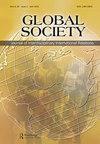Postcolonial Logic and Silences in Strategic Narratives: Sweden’s Feminist Foreign Policy in Conflict-Affected States
IF 2.3
Q2 INTERNATIONAL RELATIONS
引用次数: 5
Abstract
ABSTRACT Drawing on a postcolonial perspective and theories of strategic narratives and silences, this article looks at how Sweden’s feminist foreign policy (FFP) was reported in the media of conflict-affected states. It improves our understanding of feminist foreign policy reception by showing that from twenty selected countries, only newspapers in ten states had content on the FFP. It is argued that this modest media coverage was guided by a lack of interest in the FFP expressed in silence as an indirect way of resistance to norm promotion. This lack of interest is conceptualised as a postcolonial disengagement with Sweden’s strategic narratives. The article further demonstrates that in the remaining ten countries the media transmitted Sweden’s strategic narratives without subjecting them to critical scrutiny. This lack of scrutiny is conceptualised as a postcolonial allowance of FFP narratives in conflict-affected states. The conceptualisation of norm reception through postcolonial disengagement and allowance advances our understanding of acceptance and rejection of gender equality norms advocated by ethical foreign policies in marginalised states. The article contributes to the emerging work on postcolonial FFP and Women, Peace and Security (WPS) by improving our knowledge on local actors’ agency in countries affected by conflict.后殖民逻辑与战略叙事的沉默——瑞典在受冲突影响国家的女权主义外交政策
摘要本文从后殖民的角度,运用战略叙事和沉默理论,研究了受冲突影响国家的媒体如何报道瑞典的女权主义外交政策。它表明,在20个选定的国家中,只有10个州的报纸有关于FFP的内容,从而提高了我们对女权主义外交政策接受的理解。有人认为,这种适度的媒体报道是因为对《公平竞争法》缺乏兴趣,而这种沉默是抵制规范推广的一种间接方式。这种兴趣的缺乏被认为是后殖民时代与瑞典战略叙事的脱节。文章进一步表明,在剩下的十个国家,媒体传播瑞典的战略叙事,而没有对其进行批判性审查。这种缺乏审查的情况被概念化为受冲突影响国家对FFP叙事的后殖民宽容。通过后殖民时代的脱离和宽容,规范接受的概念化促进了我们对边缘化国家道德外交政策倡导的性别平等规范的接受和拒绝的理解。这篇文章通过提高我们对受冲突影响国家的地方行为者机构的了解,为新出现的后殖民FFP和妇女、和平与安全工作做出了贡献。
本文章由计算机程序翻译,如有差异,请以英文原文为准。
求助全文
约1分钟内获得全文
求助全文
来源期刊

Global Society
INTERNATIONAL RELATIONS-
CiteScore
3.10
自引率
6.20%
发文量
32
期刊介绍:
Global Society covers the new agenda in global and international relations and encourages innovative approaches to the study of global and international issues from a range of disciplines. It promotes the analysis of transactions at multiple levels, and in particular, the way in which these transactions blur the distinction between the sub-national, national, transnational, international and global levels. An ever integrating global society raises a number of issues for global and international relations which do not fit comfortably within established "Paradigms" Among these are the international and global consequences of nationalism and struggles for identity, migration, racism, religious fundamentalism, terrorism and criminal activities.
 求助内容:
求助内容: 应助结果提醒方式:
应助结果提醒方式:


